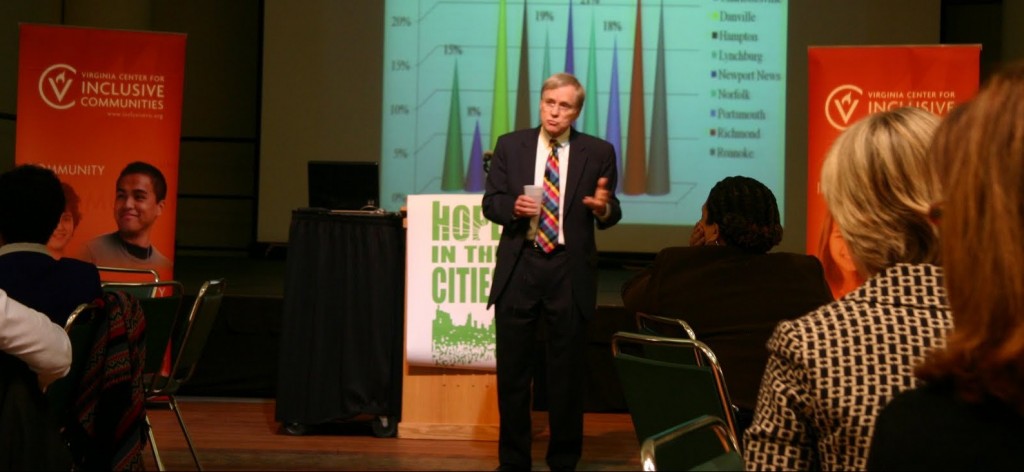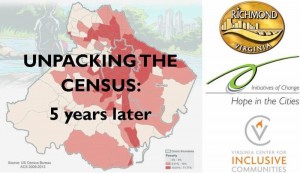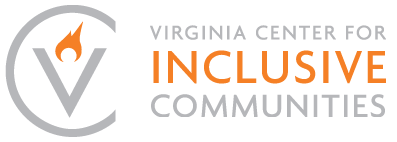Unpacking the Census

The Virginia Center for Inclusive Communities partners with Initiatives of Change/Hope in the Cities to facilitate “Unpacking the 2010 Census: The New Realities of Race, Class, and Jurisdiction.” The program features research from Dr. John V. Moeser, Senior Fellow at the Bonner Center for Civic Engagement at the University of Richmond. Alongside the “Unpacking the Census” public education program, the City of Richmond launched an Anti-Poverty Commission that evolved to become the Office of Community Wealth Building.
Unpacking the Census is spotlighted as a national best practice by the Kellogg Fellows Leadership Alliance.
Components include:
- “Unpacking the Census: Five Years Later” Forum (March 22, 2016)
- “Unpacking the 2010 Census Convocation” (May 18, 2012)
- Community Presentations & Dialogues
- Facilitator Training (January 7-8, 2012)
- “Unpacking the 2010 Census: The New Realities of Race, Class, and Jurisdiction” Launch Event (March 18, 2011)
Unpacking the Census: Five Years Later” Forum (March 22, 2016)
 The City of Richmond’s Office of Community Wealth Building, Initiatives of Change/Hope in the Cities, and the Virginia Center for Inclusive Communities convened a forum on March 22, 2016 at the Richmond Times-Dispatch (300 East Franklin, Richmond). The program featured presentations and remarks from City of Richmond Mayor Dwight C. Jones, Dr. John V. Moeser, Dr. Thad Williamson, and others. At “Unpacking the Census: Five Years Later,” the community marked 5 years of sustained efforts to reduce poverty’s impact throughout the region and refreshed this vision for the future.
The City of Richmond’s Office of Community Wealth Building, Initiatives of Change/Hope in the Cities, and the Virginia Center for Inclusive Communities convened a forum on March 22, 2016 at the Richmond Times-Dispatch (300 East Franklin, Richmond). The program featured presentations and remarks from City of Richmond Mayor Dwight C. Jones, Dr. John V. Moeser, Dr. Thad Williamson, and others. At “Unpacking the Census: Five Years Later,” the community marked 5 years of sustained efforts to reduce poverty’s impact throughout the region and refreshed this vision for the future.
- Poverty Forum Reveals Locality Differences (Richmond Times-Dispatch)
Unpacking the 2010 Census Convocation (May 18, 2012)
Over 100 people gathered at Virginia Commonwealth University to discuss next steps in the “Unpacking the 2010 Census: The New Realities of Race, Class, and Jurisdiction” program. Remarks were offered by City of Richmond Mayor Dwight C. Jones, Dr. John V. Moeser, program evaluator Dr. Bonnie B. Dowdy, volunteer facilitators Charles Williams and Marti Williams, and others. A panel also explored interventions to poverty in areas including education, housing, transportation, and workforce development.
- “Poverty in Richmond: How Long Must We Wait?” (Richmond Times-Dispatch)
- “Make Tackling Poverty Job #1” (Blog Post)
- “Those With Knowledge Grow Stronger” (Blog Post)
Community Presentations and Dialogues
Thanks to funding support from the W.K. Kellogg Foundation and The Community Foundation Serving Richmond and Central Virginia, a team of nearly 40 volunteer facilitators have led over 80 “Unpacking the 2010 Census: the New Realities of Race, Class, and Jurisdiction” presentations and dialogues since February 2012. Two version of the program are available:
- 2-hours, which includes 2010 census data, historical context, and public policy implications
- 1-hour, which includes 2010 census data
Participant groups have included businesses, healthcare providers, educational institutions, non-profit organizations, houses of worship, and boards/commissions. Unpacking the 2010 Census presentations and dialogues took place in Chesterfield County, Goochland County, Hanover County, Henrico County, and the City of Richmond.
The program was comprehensively evaluated by Dr. Bonnie B. Dowdy in 2012.
Facilitator Training (January 7-8, 2012)
Nearly 40 volunteers received facilitation skills training from Initiatives of Change/Hope in the Cities and the Virginia Center for Inclusive Communities to be prepared to lead “Unpacking the 2010 Census: The New Realities of Race, Class, and Jurisdiction” presentations and dialogues. The training took place at Richmond Hill from January 7-8, 2012.
Unpacking the 2010 Census: The New Realities of Race, Class, and Jurisdiction” Launch Event (March 18, 2011)
In an effort to raise awareness and promote action regarding wide gaps along lines of race and class in metropolitan Richmond, Initiatives of Change/Hope in the Cities, the Virginia Center for Inclusive Communities, and ConnectNetwork co-sponsored “Unpacking the 2010 Census: The New Realities of Race, Class, and Jurisdiction”on March 18, 2011. Over 200 community leaders attended the forum, which was hosted by Virginia Commonwealth University.
Dr. John V. Moeser, Senior Fellow at the University of Richmond’s Bonner Center for Civic Engagement, delivered the keynote presentation. During the forum, Richmond Mayor Dwight C. Jones announced the creation of an Anti-Poverty Commission. After his remarks, participants moved into small groups to explore the impact of poverty in one of six sectors: business, civic life, education, healthcare, housing, and religion.
Outcomes from the launch event were outstanding. 91% of attendees reported that they increased their knowledge as a result of attending. Over half stated that they planned to be more active in addressing poverty in the region.
- Richmond Mayor Appoints Anti-Poverty Commission (Richmond Times-Dispatch)
